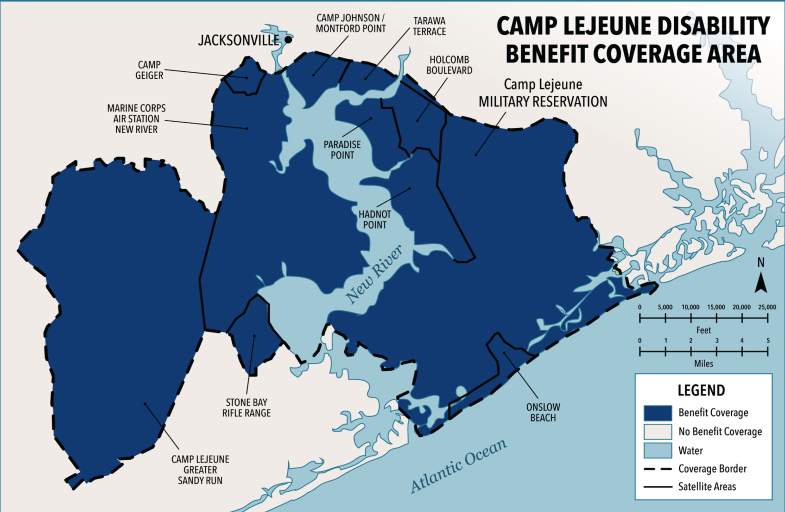Did you or a loved one suffer infertility after being exposed to the toxic chemicals at Camp Lejeune? If so, you might have grounds to file a lawsuit. If you are interested in learning more about the legal options available to you, do not hesitate to reach out to the experts here at our law firm as soon as possible. Here at the Normandie Law Firm, our lawyers have decades of experience handling all sorts of claims, including those resulting from infertility after exposure to toxic chemicals. If you are ready to discuss your legal options and the possible value of your claim with the experts here at our firm, contact us today.
What is Infertility?
Infertility is the inability to get pregnant after at least one year of actively trying to conceive or at least six months if the woman is over 35 years old. Women who can get pregnant but continue to miscarry are also considered to be infertile. There are many things that could lead to infertility, one of them being exposure to toxic chemicals.
Being infertile can be devastating for women; however, there are fertility treatments that can help women have biological children. These treatments include artificial insemination, intrauterine insemination, in vitro fertilization, natural cycle in vitro fertilization, using donor eggs, freezing eggs, and using fertility drugs, for instance. In some cases, surrogacy is recommended. Unfortunately, these treatment options do not work for everyone.

An Overview of What Happened at Camp Lejeune
Between 1953 and 1987, the water at Camp Lejeune, a Marine Corps base camp in North Carolina, was highly contaminated. Both well water and groundwater was contaminated with multiple chemical, including tetrachloroethylene (PCE or PERC), trichloroethylene (TCE), vinyl chloride, and benzene. Unfortunately, military leadership was well aware of the dangers presented by the contaminated water but failed to take any action to keep residents and staff on the base safe. Over one million Marines, military service members, civilians, contractors, and their families were affected by the exposure to the toxic water at the camp. The exposure to the contaminated water resulted in the development of multiple conditions, one of which was female infertility.
PACT Act and the Right to Sue
On August 10, 2022, the Camp Lejeune Justice Act as part of the Promise to Address Comprehensive Toxics (PACT) Act was signed into law. The PACT Act allows those who suffered harm (developed medical conditions and/or passed away) after being exposed to the contaminated water supply at Camp Lejeune to file a lawsuit against the government with the United States District Court for the Eastern District of North Carolina. This means that all affected parties or the families of the deceased could have grounds to file a lawsuit and recover damages.
Under the PACT Act, those who lived at or worked at the base camp for at least 30 days between 1953 and 1987 can file a lawsuit. This applies to veterans and their civilian families living on the base, other non-military staff, contractors, and the families of the deceased. Pregnant women that suffered miscarriages and women who developed infertility also have the right to file a lawsuit.
If you or a member of your family was dishonorably discharged, then you likely will be ineligible to file a lawsuit.
The Compensation Available for Recovery
Could you recover compensation if you developed infertility after being exposed to the contaminated water at Camp Lejeune? Yes – you could be entitled to compensation. Some of the compensation that you could recover could include the following:
- Medical expenses
- Costs of mental health services, including counseling
- Lost earnings
- Pain and suffering
- Punitive damages
- Legal expenses
Here at our law firm, you can trust that our lawyers are ready to fight for your right to recover the highest settlement available for your claim. For more information about the specific compensation that you could be eligible to recover, contact the experts here at our law firm today.

What Factors Affect the Value of My Claim?
The value of your claim will be based on the specific factors surrounding your situation. One of the most important factors is medical costs. With infertility, specifically, there are many options for women. Even though women might be unable to get pregnant or stay pregnant naturally, they can choose to undergo fertility treatments to try to have their own biological children. Unfortunately, these fertility treatments can be very expensive and are usually not covered by insurance.
For instance, the costs of initial fertility tests and evaluations can be up to $4,600 (for ultrasounds, blood tests, etc.). Basic fertility treatments can cost almost $15,000. If a woman wants to try in vitro fertilization, she can expect almost $20,000 in costs – for just one attempt. Things brings us to a total of $40,000 for starters. If the treatment doesn’t work, it must be repeated until it works. If donor eggs or even a surrogate is used, this cost increases significantly.
Another major factor to consider is the mental and emotional distress caused by infertility. Women who suffer from infertility can feel incomplete – they can suffer depression, anxiety, fear, etc. On top of dealing with the infertility, women are also likely to endure immense mental and emotional anguish during every fertility treatment. This can result in a very high value for pain and suffering.
For more information about the factors that can affect the value of your Camp Lejeune infertility lawsuit, contact us today.
What is the Average Value of a Camp Lejeune Infertility Lawsuit?
Above, we discussed some of the factors that can affect the value of your claim. Although every claim is different, these claims can start at $350,000. Considering all the details surrounding the case, these cases can be worth $750,000 or even more. For more information about the average value of these cases and what you could possibly recover if your lawsuit is successful, contact us today.

File Your Claim Promptly
Even if your claim is valid, you could lose the right to sue if you fail to file your lawsuit within the appropriate length of time. The PACT Act created a two-year window from the date that the act was signed into law for claimants to file their claims. This means that you could have until August 2024 to file your lawsuit. For more information about the total length of time that you have to file your water contamination infertility lawsuit, do not hesitate to contact the experts at our law firm immediately.
Contact the Normandie Law Firm Today
If you are ready to explore the legal options available to you and learn more about the possible value of Camp Lejeune infertility lawsuits, do not hesitate to contact the experts here at our law firm immediately. Our lawyers here at the Normandie Law Firm are ready to evaluate your claim and help you recover the highest payout available. If you are ready to speak with our lawyers or would like to learn more about the payout that you could be eligible to receive, contact us as soon as possible. Our lawyers are more than ready to help you.
Here at our firm, we offer free legal services. These free legal services include free consultations and free second opinions. During these free legal services, our lawyers will be available to answer all your questions, address all of your concerns, and give you absolutely all the information that you need to begin or continue your claim. It doesn’t matter whether you are thinking about starting your claim or redirecting your claim; our lawyers can help you.
Our Zero-Fee guarantee ensures that our clients will never be required to pay any upfront legal costs for our legal services. In addition, we work on contingency; therefore, you will not be required to pay anything until you win your claim. If you don’t win your lawsuit, you will not pay anything.
Contact us today to learn more about the legal options available to you.
Other Pages on Our Website Related to This Topic
The Average Value of Camp Lejeune Kidney Cancer Claims
Lawyer for Parkinson’s Disease Camp Lejeune Lawsuit
Lawyer for Esophageal Cancer Camp Lejeune Lawsuit












